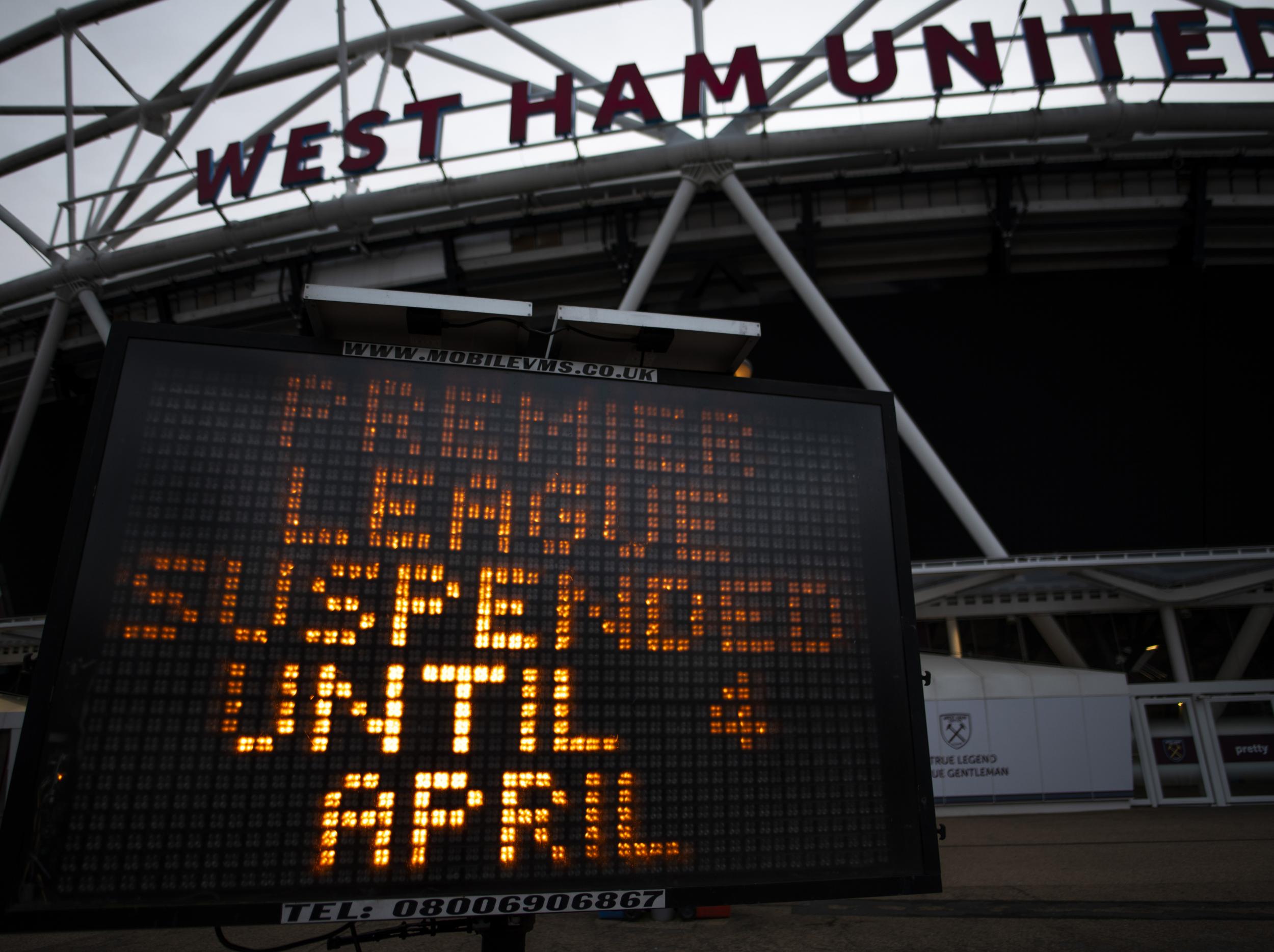Ignore West Ham. The coronavirus pandemic is not the time for cheap point-scoring
West Ham United would like the season to be voided and start again. They are not alone. But Tony Evans argues that if ever there was a time to put away rivalries, it is now


For a moment on Friday, everyone in football came together. Suspending the season because of the impact of Coronavirus was the right thing to do and this view was almost unanimous, despite a widespread belief that the campaign will not restart before the summer.
It did not take long for the fault lines and agendas to appear. Less than 24 hours into the new age, a time when considered reflection and thoughtful planning might be in order, the self-interested knee-jerking began.
West Ham United would like the season to be voided and start again. They are not alone. A number of other clubs are keen on expunging the memory of the past seven months and pretending it did not happen. It’s just that West Ham’s venal boardroom culture means that their executive vice-chairman was the only person gauche enough to say it publicly, in a red-top tabloid with a history of crass and offensive interaction with the game.
They are not thinking about the integrity of competition in the East End. The solo consideration is that West Ham are only out of the relegation zone on goal difference and still in real danger of the drop. They would very much like that threat taken away.
Jurgen Klopp made far more sense, concentrating on bigger issues like people’s safety in the face of the pandemic. “If the choice is between football and wider society, it’s no contest,” the Liverpool manager said. “Really, it isn’t.”

They would probably nod their heads in agreement in the West Ham directors’ box. And then come to the diametrically opposite conclusion about what Klopp meant.
The German had to allude to the question of whether the season should be erased from the record books but it was a throwaway line rather than the important message in his statement. His team are 25 points clear at the top of the Premier League with nine games remaining. Again, though, the 52-year-old was measured and sensible. “We have to have belief that the authorities make decisions based on sound judgement and morality,” he said.
If ever there was a time to put away rivalries, at least on a temporary basis, it is now. Klopp is right. The direction of the title race – and promotion, relegation and the European spots – are not significant issues for the time being. But some people cannot help themselves, even those who should know better.
One television pundit evoked 1939-40 on social media to suggest the season should be cancelled, citing it as a precedent. Blackpool, who were top of the table when the second world war broke out, were not declared champions. The flaw in this nonsense – it would be wrong to dignify it with the word ‘reasoning’ – is that hostilities commenced in September and league football stopped immediately. Three games had been played in the top flight at that point. The faintest grasp of history exposes the absurdity of any parallels with today.
The real parallels for football are not with 1939 but 1989. The aftermath of Hillsborough was the last moment when the game had a chance to take stock and consider how to move forward in a coherent manner. That opportunity was botched in the headlong rush to restructure the sport by putting the emphasis on the elite clubs and cash.
Football was going through a period of seismic change 31 years ago and the threat of breakaway leagues and financial uncertainty was the backdrop for the disaster at the FA Cup semi-final in which 96 Liverpool supporters died. Hardly anyone paused for breath. Except for Liverpool, who took 2 ½ weeks off, everyone played on as normal.
Consequently Hillsborough acted as a catalyst for developments that would make attending matches unaffordable for many and elevate television into the most important influence on the game. The subsequent events stretched the bonds between clubs and the communities that traditionally supported them and, most crucially, opened the wealth gap between the rich and poor so wide that the majority of professional teams struggle to survive.
This latest crisis may signal the end for dozens of small clubs across Britain and Europe. Gate receipts keep many local institutions afloat. A prolonged period where no one pays through the turnstiles could lead to significant closures in the lower leagues.
Coronavirus has forced a break. This could be a period of contemplation where football’s leaders can ask themselves where the game should go and how can the sustainability of the sport be maintained. The viability of competition in the future should not just be predicated on the adventures of the biggest clubs. The infrastructure needs to be protected from the bottom up.
All West Ham are interested in is staying up and ensuring that their interests are protected. To hell with everyone else. They are not the only selfish ones. The question is not about whether the season should be cancelled but this: Where do we go from here?
This health-scare interlude offers a rare opportunity to consider the future but, as West Ham illustrate, the self-serving, the greedy and the shortsighted are already crawling out of the dungheep and doing the football version of panic buying and hoarding. Their only reaction to a crisis is to think about themselves.
Join our commenting forum
Join thought-provoking conversations, follow other Independent readers and see their replies
Comments
Bookmark popover
Removed from bookmarks